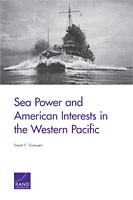| 来源类型 | Research Reports
|
| 规范类型 | 报告
|
| ISBN | 9780833078902
|
| 来源ID | RR-151-OSD
|
| Sea Power and American Interests in the Western Pacific |
| David C. Gompert
|
| 发表日期 | 2013
|
| 出版年 | 2013
|
| 页码 | 216
|
| 语种 | 英语
|
| 结论 |
The Nature of Sino-U.S. Competition in the Western Pacific and the Prospects for Cooperation - China is intent on establishing sea power in the Western Pacific, and the United States is just as intent on refusing to relinquish such power.
- The sea-power rivalries between the United States and Britain and between Imperial Germany and Britain in the 19th century, and between Imperial Japan and the United States in the 20th, provide important lessons for the relationship between China and the United States in the 21st century. Each is an example of a rising sea power challenging an established one.
- Technological advances have made it clear that sea power is power of the sea, which may or may not be achieved via power on the sea. China will likely seek to establish sea power by building up anti-naval capabilities rather than trying to replicate the United States' naval capabilities — i.e., its surface fleet, which is increasingly vulnerable.
- Although traditional theory holds that establishing and maintaining sea power inherently involves competition between nations, a newer school of thought suggests that nations should cooperate on maritime security to promote global trade. The integration of the global economy — and in particular the economic interdependence between the United States and China — means that cooperative maritime security stands a better chance of overcoming rivalry today than ever before.
|
| 摘要 |
- The United States should pursue a strategy of making its sea power less vulnerable by relying more on submarines, drones, and smaller, elusive, widely distributed strike platforms.
- The United States should also pursue a political alternative to head-to-head sea-power rivalry — one that engages its partners in the Western Pacific and, ideally, China itself.
- The United States should propose and pursue an East Asian maritime security partnership. If China joins such a partnership, it may provide a path for the United States and China to avoid sea-power competition in the region; and if China does not join, such a partnership will still solidify U.S. leadership among allies in the region and provide a political and operating framework for American sea power in the Western Pacific.
|
| 主题 | China
; East Asia
; Global Security
; Maritime Piracy
; Naval Warfare
; Pacific Ocean
; United States
; United States Navy
|
| URL | https://www.rand.org/pubs/research_reports/RR151.html
|
| 来源智库 | RAND Corporation (United States)
|
| 资源类型 | 智库出版物
|
| 条目标识符 | http://119.78.100.153/handle/2XGU8XDN/107603
|
推荐引用方式
GB/T 7714 |
David C. Gompert. Sea Power and American Interests in the Western Pacific. 2013.
|
|
文件名:
|
x1495316262389.jpg
|
|
格式:
|
JPEG
|

|
文件名:
|
RAND_RR151.pdf
|
|
格式:
|
Adobe PDF
|
除非特别说明,本系统中所有内容都受版权保护,并保留所有权利。